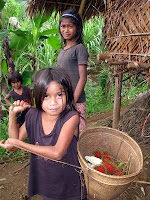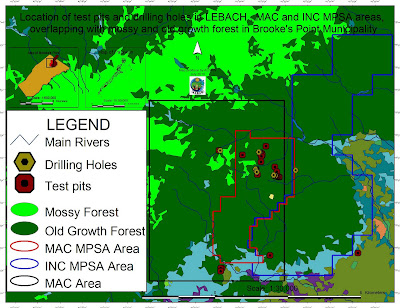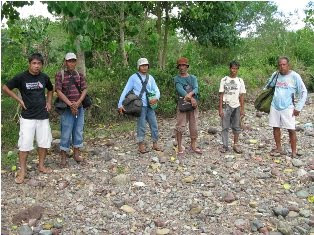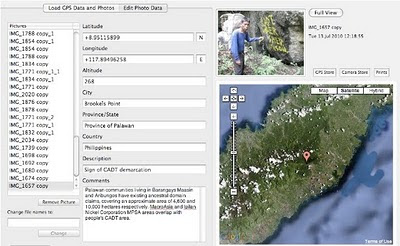Puerto Princesa - ALDAW - On July 30, over 20 members of the Palawan Council for Sustainable Development (PCSD) - a local government body in charge of the protection and sustainable management of the Province meet to decide whether to issue a SEP (Strategic Environmental Plan) clearance to the mining operations of MacroAsia Corporation (MAC for brevity) with reference to a 91ha area, out of the approved Mineral Production Sharing Agreement area of over 1300 hectares.

The area for which SEP clearance is being sought consists of well-conserved forest which provides clean water to lowland communities and which is also part of the traditional territory of Palawan tribes living in Brooke’s Point Municipality. During the last PCSD meeting, thanks to the support of Atty Grizelda Mayo-Anda (representing the NGOs community within the Council) and through the effective mediation of Governor Abraham Kahlil Mitra, the ALDAW network (Ancestral Land Domain Watch) was allowed to present ‘geotagged’ findings collected in two separate field surveys carried out in collaboration with the Centre for Biocultural Diversity (CBCD) of the University of Kent (UK). In a photographic context, geotagging is the process of associating photos with specific geographic locations using GPS coordinates. GPS coordinates were obtained through the use of a professional device connected to the camera’s hot shoe during the entire mission’s reconnaissance in the hinterlands of Ipilan and Maasin (Brooke’s Point Municipality). The obtained GPS coordinates were later overlaid on PCSD maps to show the overlapping between core zones and MAC mining activities. Overall the findings indicates that: 1) over 95% of test pits and drilling holes in MAC MPSA area are located in “core zones” and biodiversity rich forest, 2) Isolated Indigenous communities are living in the MPSA area of MAC (these have never been consulted about MAC operations); 3) The 91ha for which SEP clearance is being sought by MAC (out of a total MPSA area of more than 1,300 ha) overlap partially with “core zones” and entirely with well-conserved and residual forest. Even more surprisingly, the mission found no evidence of test pits and drilling holes in the recommended 91ha area. “This area includes sacred places where our Palawan indigenous communities carry out their own rituals. Moreover, portions of the Ipilan river and other tributaries which provide potable and irrigation waters to the lowland farmers are also found inside the area” explained ALDAW Chairman Artiso Mandawa.

In a nutshell the joint ALDAW/CBCD presentation clearly demonstrates that MAC mining interests are really concentrated in primary virgin forest. Geotagged photos portray test pits and drilling holes, found around 800m and even above 1,000m ASL. These evidences generated a lively debate amongst PCSD council members. PCSD representative/Congressman Antonio C. Alvarez asked confirmation to MacroAsia spokesman on whether their explorations activities are really located in core zones of “maximum protection”. To the surprise of all participants, MACROASIA representatives did not deny but rather confirmed the evidences brought forward by the ALDAW investigation team. However, they also stated that their permit to explore in ‘core zone’ was legally given by DENR and further endorsed through a SEP clearance by the PCSD. This assertion gave more ground to Congressman Alvarez to challenge Romeo Dorado, PCSD executive director: “a permit to explore core zones is not just a piece of paper, it actually entails the manipulation and disturbance of areas that, in principle, should be maintained free of human disruption. If the PCSD has allowed the exploration of core zones, it means that there is something wrong here” said Alvarez. Director Romeo Dorado clarified that, although the area used by MAC for exploration purposes is mostly located in core zones, the PCSD is only prepared to endorse to MacroAsia 91ha area out of the total MAC MPSA area of about 1300ha. Dorado’s reassurance was unconvincing and raised more questions than answers. In fact, according to the evidence presented by ALDAW team, there are no signs of exploration in the proposed 91hectares, no test pits and drilling holes and – in fact – as it was later confirmed by MacroAsia itself - no valuable minerals are found in the applied area. “What’s the purpose of getting an endorsement for this area, while the minerals that the companies want to extract are located much further in the uplands?” asked Alvarez. Atty Gerthie Mayo-Anda picked up on this argument: “we should really understand the ‘economic implications’ of the 91-hectare area. Surely if the company does not consider it commercially viable to just mine 91 hectares, they would want a much larger area which means that their targets for mineral extraction are really the core zones and the protected area!” said Mayo-Anda. Again, MacroAsia representatives had no valid argument on which to cling and rather admitted that the 91ha area for which SEP clearance is requested will be used as an ‘installation base for the company’. Having said this, MAC representatives provided no information on the exact location where the actual mining extraction would actually take place. During the meeting, Atty. Mayo-Anda further stressed that MAC’s MPSA area is located inside the recently declared Mount Mantalingahan Protected Landscape (MMPL), pursuant to Presidential Proclamation no. 1815. MacroaAsia representatives contested the assertion by claiming that, according to the same Proclamation, any valid contract for the extraction of natural resources already existing prior to the proclamation should be respected until its expiration. According to Dr. Dario Novellino (CBCD researcher and partner of ALDAW) the MAC spokesmen omitted a very important paragraph found in the same proclamation which specifies that areas covered by such contracts, which are found not viable for development after assessment shall automatically form part of the MMPL. “According to our field research, the areas claimed by MAC is not viable for any form of aggressive development, due to its particular ecological characteristics and specific landscape value” said Novellino. Atty. Mayo-Anda further challenged the MAC spokesman by clarifying that “the vested argument is skewed and cannot be sustained. It is well-settled in Philippine jurisprudence that exploration, development and utilization of natural resources through licenses, concessions or leases are mere grants or privileges by the State; and being so, they may be revoked, rescinded, altered or modified when public interest so requires” said Mayo-Anda. While MacroAsia representatives admitted that their concession overlaps with the Mantalinghan Proclaimed area, they also questioned how much of it is really located in core zones. “Part of their defence argument was based on their own subjective interpretation of core zone. They kept arguing that ‘core zones’ are above 1000 m ASL, to prove that most of their exploration and extractive activities are legal, being below that altitude. In reality according to SEP law core zones do not just include areas above 1000 meters elevation but all types of natural forest: first growth forest, residual forest and edges of intact forest, endangered habitats, etc. These are exactly the kind of places where MAC has been concentrating its own mining activities” said Novellino.
To the surprise of both NGOs and indigenous participants, the representative of the Mineral Geoscience Bureau of the Department of Environment and Natural Resources proposed that it would be better to revise the ‘core zones’ rather than challenging the company’s actions and operations. Again this statement ignited the debate even further “ECAN amendment in Brooke’s Point would be inconsistent. Any proposed change to the zoning system should be discussed publically in a Barangay Assembly and in close consultation with the communities. Core zones should be protected rather than amended to accommodate the interests on the mining companies” responded Mayo-Anda and Congressman Alvarez.
In addition to geotagging and ocular inspection, MacroAsia was also challenged on the bases of social acceptability. “It will not be difficult to establish that the people of Brookes Point are overwhelmingly against any mining. This is what we indigenous peoples and farmers have been trying to communicate to the government for the past two years through public demonstrations and rallies but they did not listen” said ALDAW Chairman Artiso Mandawa.

MAC representatives insisted that, as far as social acceptability is concerned, all documentation from the National Council for Indigenous Peoples (NCIP) had already been secured. However, according to Commissioner Atty. Felongco representing the NCIP on the meeting “applications are still pending and no final decision by NCIP has been made. On the contrary, we have been requesting additional documentation to the local government, since two barangays have not yet been consulted”. Governor Baham, chairing the meeting, expressed his discontentment for the NCIP inability to respond promptly to the lack of documentation relating to ‘social acceptability’. “From now on, NCIP provincial office should communicate its findings directly to the NCIP national office. Passing through the regional office, delays the whole procedures and creates anomalies” said Governor B. Mitra. He also posed the question on whether and to what extent previous local government endorsements to MacroAsia would still be confirmed after the forthcoming Barangay election. “I think all these crucial matters should be re-discussed and reviewed by the new barangay administration, as soon as it is elected and become operative” said Governor Mitra. Adding more points to the argument, Atty. Mayo-Anda suggested “municipal government officials should visit personally the area claimed by MAC to get a clear idea of the location, vegetation cover and actual land uses; and such crucial decision cannot be made just by tracing lines on a map”. During the PCSD meeting, also former Congressman Alfredo Amor Abueg Jr. asked the Council for a re-evaluation of all requirements provided by MacroAsia, especially those related to Barangay government, NCIP and to the Province itself. “All previous endorsements given by the local government should now be re-evaluated on the bases of evidences brought forward by the ALDAW team” he said.
Hon. Baham Mitra, Governor of Palawan and newly elected PCSD chairman, finally approved the motion. This entails that the decision to endorse a SEP clearance to MacroAsia is deferred until a multipartite team composed of PCSD technical staff, local government officials, NGOs and Indigenous Peoples’ representatives visits the proposed area and investigates the ALDAW findings and all pending issues raised by the NGO community. The team should also be in charge of determining: 1) the legality of endorsements by local government units; 2) the expected impact of mining on indigenous culture and livelihood; 3) the potential impact of mining on tourism industry; 4) the economic value of the 91 hectares for which SEP clearance is being sought by MacroAsia.
“This is just an initial victory for the indigenous peoples and our NGOs supporters” commented Artiso Mandawa (ALDAW Chairman) at the end of the meeting. “It proves that illicit affairs are not unstoppable, when the evidence brought forward is there to light up every dark corner and to expose all bed practices of mining companies and their political allies” addend Mandawa.
Some reflections on the way forward

The last PSCD meeting agenda has shed light on a number of issues that apply not only to MacroaAsia but to the vast majority of mining companies in Palawan whose operations can be questioned both from the perspective of ‘social acceptability’ and ‘environmental sustainability’. Several major mining projects that are in the pipeline in Palawan have been endorsed by local government officials, but have not been approved by the communties that would host them. Mining incursion in core zones and forested areas of high-biological diversity has already occurred in other areas. Geotagging findings, as those collected with reference to MacroAsia MPSA area, have already been gathered for the concession areas of Ipilan Nickel Corporation (INC) bordering MAC concession, as well as for Bulanjao range, one of the most valuable biodiversity hot spots in Southern Palawan. Here the mining road of Rio-Tuba Nickel Mining Corporation has already reached the highest fringes of the Bulanjao, at an latitude of 859m, causing deforestation, sever soil erosion and damage to the Sumbiling river watersheds. Evidence indicates that also the mining applications of Narra Nickel Mining and Development, Inc. (NNMDC), Tesoro Mining and Development, Inc. (TMDI), and McArthur Mining, Inc. (MMI) - approved through a Financial and Technical Assistance Agreement (FTAA) – and partnering with the Canadian MBMI - will surely encroach into core zones leading to the devastation of precious watersheds, indigenous ancestral territories and productive rice-land. The same applies to the City Nickel company in Espanola municipality and Fujian-Sino Mining Corp in Roax Municipality.
To avoid the transformation of Palawan (the Last Philippine’s Frontier) into a mining destination the following actions would be required.
The Local Government (LGU)
The LGU should ensure that all mining related decisions which are likely to affect local communities and their environment, be discussed with an independent committee formed by indigenous peoples, local farmers, NGOs and IPs organizations’ representatives in order to enhance transparency and accountability in decision making process.
Moreover, the LGUs should stick to their original Municipal Comprehensive Land Use Plans (CLUPs) without trying to reclassify ECAN zones into multiple/manipulative use zones to allow extractive activities.
The PCSD should stop issuing permits to mining companies to operate in ecologically precious and/or fragile areas, since this is in violation with the agency’s own mandate. Even more importantly, PCSD should stop any attempt of changing the definition of core zones and other zones to allow mining activities in forested land. It has already been established that some definitions such as those of ‘controlled use zones’ have been amended by the Council to please big corporations’ interests. For instance, according to the SEP law, in Controlled Use Area – (the outer protective barrier that encircles the core and restricted use areas) “strictly controlled mining and logging, which is not for profit…may be allowed”. Recently the ‘not for profit’ specification has been eliminated, thus opening these zones to commercial extractive activities.
Evidence, also indicate that PCSD maps are also inconsistent with the SEP zoning criteria. For instance, those areas that encircle and provide a protective buffer to the ‘core zones’, rather than being demarcated in blue (the color of restricted-use zones) are demarcated in brown, the color of ‘controlled use zones’ where mining is now allowed. These inconsistencies should be explained and rectified by the PCSD, as soon as possible.
Before, issuing SEP clearances the PCSD should consult indigenous and farmers communities. As of now, this has never been the case.
The Department of Environment and Natural Resources (DENR)
The DENR should stop fast-tracking mining contracts in Palawan. It should make watersheds off-limits to mining, as well as those areas of high biodiversity and endemism, to include Indigenous Peoples’ Ancestral Domains. This should lead to the suspension of all existing MPSA and FTAA until all controversial issues and ambiguities are clarified.
Ultimately, the DENR should solve its inherent conflict of interest caused by its dual functions: on one hand protecting the environment and the indigenous peoples and, on the other, promoting mining. Therefore, it is suggested that the responsibility related to the issuing of mining licenses should be dealt with by the Department of Mines, Hydrocarbons and Geosciences.
The NCIP
NCIP should stop issuing certificate of pre condition/clearances to mining applications and influencing indigenous peoples into endorsing mining projects. NCIP should also ensure that all FPIC processes carried out in conjunction with mining issues are evaluated by an independent body formed by indigenous leaders elected by their own communities, by representatives of indigenous organizations and, if the latter require so, by members (researchers, journalists, advocates, etc) of foreign institutions.
The National Government
The State should call for an immediate halt of mining operations in Palawan since such activities contravene those provisions contained in well-know conventions ratified by the Philippine Gove[e.g. The Convention on Biological Diversity (CBD)], the UN Declaration on the Rights of Indigenous Peoples. The Convention concerning the Protection of the World Cultural and Natural Heritage and; the Convention for the Safeguarding of the Intangible Cultural Heritage.
Ultimately, the National Government should revoke the 1995 mining act and issue a new act placing more emphasis on human rights and ecological balance, while regulating mining for the public interest.
The Provincial Government
In late 2008, the provincial board of Palawan has passed a provincial resolution providing for a moratorium on small-scale mining for a period of 25 years. This local legislative effort is not enough to prevent large scale and exploration activities in the province. The Provincial Government should prove and demonstrate to the National Government that the revitalization of the mining industry is not compatible with the special environmental status of Palawan Island, nor with the PCSD’s primary goal of achieving sustainable development in accordance with the Strategic Environmental Plan (RA 7611).
The UNESCO
Having established Palawan as a “Man and Biosphere Reserve” the UNESCO should play a more incisive and pro-active role, specifically when national governments, such as the Philippines, violate the condition for which such ‘prestigious awards’ have been granted.
Source: ALDAW
























